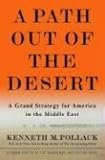Beyond whether who he will appoint to handle the Israeli-Palestinian conflict, President Obama has to choose what kind of approach he will pursue. Two Arab diplomats (a Palestinian and an Egyptian) who are peace process veterans wrote this powerful op-ed advocating a hands-on approach that shuns the “capacity-building” gradualist approach and recommends going against the Washington received wisdom (received from Zionist think tanks, that is) that there isn’t much to be done:
“Experienced” advisers will point out that the issues are complex, the leaders are weak and divided, and the costs of failure are formidable. They will urge you to take small steps and let the parties lead. The United States, they will argue, should support bilateral talks from the sidelines, but cannot want peace more than the parties themselves.
As former advisers to two of the governments in the region, and having participated in developing the Road Map peace plan, we assure you that is exactly the wrong approach. It is because the parties are weak that American leadership is indispensable. It is because bilateral negotiations yield only hollow communiqués that you should use your political capital to forge consensus on substance. And it is because the issues are complex that small achievements — fleeting cease-fires, relocated checkpoints — are as politically costly as big ones. The Bush administration wasted six years before learning these lessons. You need not repeat its mistakes.
Aim high. The region will not hesitate to supply your administration with a series of crises that demand urgent attention — breakdowns in talks, escalations in violence, right-wing electoral triumphs, settlement expansion and the like. These crises cannot be ignored. But you must not allow managing the conflict to distract you from the crucial task of resolving it. Each passing day, Israel’s occupation produces despair and facts on the ground that make the conflict ever more difficult to solve.
What is needed is a substantive framework for comprehensive peace, endowed with international support and ready for the parties’ acceptance. Like the Road Map, you should develop this framework in consultation with the parties and international partners. But unlike the Road Map, it should specify a destination, defining the central terms of a settlement with sufficient precision to prevent interminable haggling over interpretation and sufficient formality to make rejection too politically costly for any serious party to contemplate.
Build commitment, then capacity. Among the foundations of President Bush’s failed Arab-Israeli policy was the notion that capacity must precede commitment, that Palestine become Switzerland before peace negotiations commence. You have pointed out the folly of such thinking in Iraq, arguing that an American commitment to early withdrawal would give Iraqis an incentive to put their house in order.
That is no less true for the Mideast peace process. Some portray the rejectionism of Hamas and Israel’s right wing as an insurmountable obstacle to peace. It isn’t. There is no peace for them to reject. However, a U.S.-backed framework for peace would oblige all parties to face the moment of truth in a way that a commitment to continue negotiations simply cannot. It would also do more to advance Palestinian governance and security reform than another decade of technical assistance.
